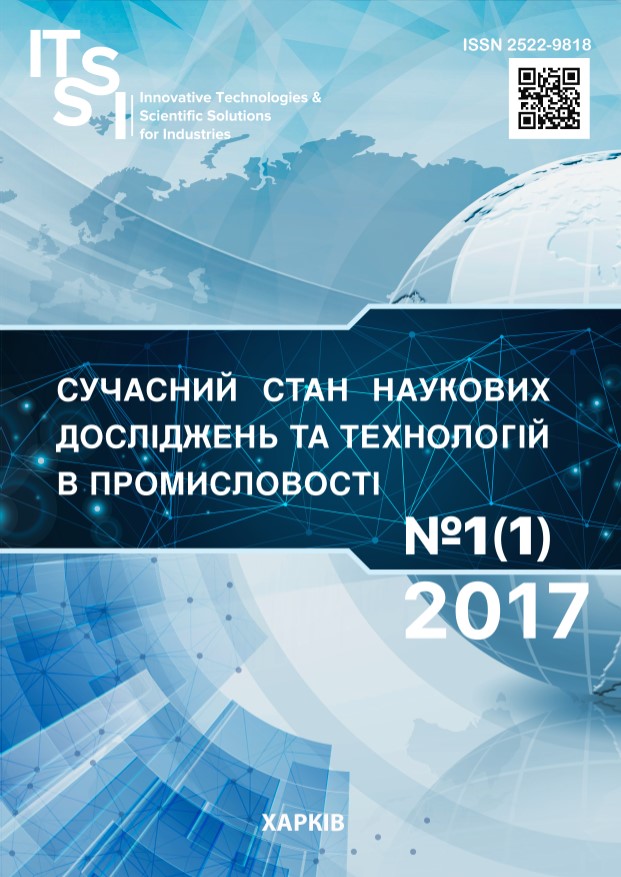МЕТОД ОСВОЄНИХ ВИМОГ ДЛЯ МОНІТОРИНГУ ВИКОНАННЯ ПРОЕКТУ
DOI:
https://doi.org/10.30837/2522-9818.2017.1.058Ключові слова:
стейкхолдери проекту, процеси управління, функціональне моделювання, PMBOK 5Анотація
Процеси управління вимогами значною мірою визначають успішність проекту і повинні забезпечувати його адаптивність до змін у вимогах зацікавлених сторін. На сьогодні ці процеси є недостатньо формалізованими, зокрема, для традиційного проектного менеджменту. Отже, є необхідність розробки та формалізації методів управління і контролю вимог. Предметом даного дослідження є методи управління вимогами стейкхолдерів у проектах. Мета статті – підвищення ефективності моніторингу вимог зацікавлених сторін проекту за рахунок розробки методу освоєних вимог та моделі, що формалізує цей метод. Для досягнення мети реалізовано наступні завдання: інтеграція ієрархічної структури вимог і класичної ієрархічної структури робот проекту з отриманням матриці контрольних точок виконання вимог стейкхолдерів, що пов’язує певну вимогу з роботами, які необхідно здійснити для її виконання; розробка методу моніторингу вимог; побудова функціональної моделі запропонованого методу. Використано методи декомпозиції, функціонального моделювання, модифікований метод освоєного обсягу. Отримано такі результати: розроблено метод моніторингу вимог, який дозволяє відстежувати виконання вимог зацікавлених сторін проекту у часі у відповідності до обсягу фактично витрачених ресурсів за аналогією з методом освоєного обсягу. Підхід, що засновано на інтеграції ієрархічної структури вимог та ієрархічної структури робот проекту, дозволяє доповнити існуючи методи класифікації зацікавлених сторін проекту показником ресурсомісткості вимог. Висновки. Запропонований метод формалізує процеси управління вимогами у проекті, дозволяє визначати ресурсне навантаження вимог, що доповнює існуючи моделі класифікації вимог цим показником. Підтримкою практичної реалізації методу є розроблена функціональна модель у нотації IDEF0. Визначено галузі проектного менеджменту (за стандартом PMBOK), для яких використання запропонованого підходу буде найбільш ефективним. У процесі формування вихідних даних для використання методу слід враховувати існування певних обмежень, які визначаються існуванням різних типів вимог зацікавлених сторін проекту і розмірністю множин "вимоги" та "роботи".Посилання
A Guide to the Project Management Body of Knowledge (PMBOK® Guide). Fifth Edition. (2013), Newtown Square, Pa.: Project Management Institute, Inc., 614 p.
Highsmith, J. (2013), Adaptive software development: a collaborative approach to managing complex systems, Addison-Wesley. Horkoff, J., Yu, E. (2014), "Interactive goal model analysis for early requirements engineering", Requirements Engineering, No. 21(1), pр. 29-61. DOI: 10.1007/s00766-014-0209-8
Darwish, N. R., Megahed, S. (2016), "Requirements Engineering in Scrum Framework". Requirements Engineering, Vol. 149, no. 8, pp. 24-29. DOI: 10.5120/ijca2016911530
Kotonya, G, Sommerville, I. (1998), Requirements Engineering: Processes and Techniques, John Wiley & Sons, 294 p.
Chemuturi, M. (2013), Requirements Engineering and Management for Software Development Projects, 266 p. DOI: 10.1007/978-1-4614-5377-2
Miranda, E. (2011), "Time boxing planning: Buffered Moscow Rules", ACM SIGSOFT Software Engineering Notes, No. 36(6), pp. 1-5. DOI: 10.1145/2047414.2047428
Husyeva, Yu. Yu., Chumachenko, I. V., Sydorenko, M. V. (2016), "Managing stakeholder education projects", Bulletin of the NTU "KhPI". Series: strategic management, portfolio, program and project management ["Upravlinnya zatsikavlenymy storonamy osvitnikh proektiv", Visnyk NTU "KhPI". Seriya: Stratehichne upravlinnya, upravlinnya portfelyamy, prohramamy ta proektamy], No 2(1174), pp. 8-12.
Practice Standard for Earned Value Management (2005), Newtown Square, Pa.: Project Management Institute, Inc., 56 p.
Husyeva, Yu. Yu., Martynenko, O. S., Chumachenko, I. V. (2016), "Process approach to modeling and monitoring requirements of stakeholders", Information technology and innovation in economics, project and program management ["Protsesnyy pidkhid do modelyuvannya i monitorynhu vymoh zatsikavlenykh storing", Informatsiyni tekhnolohiyi ta innovatsiyi v ekonomitsi, upravlinni proektamy ta prohramamy], pp. 289-296.
Husyeva, Yu. Yu., Martynenko, O. S., Chumachenko, I. V. (2016), "Decomposition and formalizing the requirements of stakeholders in the process model", International scientific-practical conference "Mathematical modeling of processes in economics and project and progamm management" ["Dekompozytsiia ta formalizatsiia vymoh cteikkholderiv u protsesnykh modeliakh", Mezhdunarodnaia nauchno-praktycheskaia konferentsyia "Matematycheskoe modelyrovanye protsessov v эkonomyke y upravlenyy proektamy y prohrammamy (MMP-2016)"], pp. 43-44.
Kadykova, I. M., Larina, S. O. (2016), "The formalization of processes - the basis of the development of information technology and project management software", Project Management: Innovation, Nonlinearity, Synergetics: Materials of the VII International Scientific and Practical Conference of Graduate Students, Graduates and Researchers ["Formalizaciya procesiv – osnova rozrobky informacijnoyi texnologij upravlinnya proektamy ta programamy" Upravlinnya proektamy: innovaciyi, nelinijnist, synergetyka: Materialy VII Mizhnarodnoyi naukovo-praktychnoyi konferenciyi magistrantiv, aspirantiv ta naukovciv], pp. 44-47.
##submission.downloads##
Як цитувати
Номер
Розділ
Ліцензія
Авторське право (c) 2018 Oleksandr Martynenko, Yuliia Husieva, Igor Chumachenko

Ця робота ліцензується відповідно до Creative Commons Attribution-NonCommercial-ShareAlike 4.0 International License.
Наше видання використовує положення про авторські права Creative Commons для журналів відкритого доступу.
Автори, які публікуються у цьому журналі, погоджуються з наступними умовами:
Автори залишають за собою право на авторство своєї роботи та передають журналу право першої публікації цієї роботи на умовах ліцензії Creative Commons Attribution-NonCommercial-ShareAlike 4.0 International License (CC BY-NC-SA 4.0), котра дозволяє іншим особам вільно розповсюджувати опубліковану роботу з обов'язковим посиланням на авторів оригінальної роботи та першу публікацію роботи у цьому журналі.
Автори мають право укладати самостійні додаткові угоди щодо не комерційного та не ексклюзивного розповсюдження роботи у тому вигляді, в якому вона була опублікована цим журналом (наприклад, розміщувати роботу в електронному сховищі установи або публікувати у складі монографії), за умови збереження посилання на першу публікацію роботи у цьому журналі.
Політика журналу дозволяє і заохочує розміщення авторами в мережі Інтернет (наприклад, у сховищах установ або на особистих веб-сайтах) рукопису опублікованої роботи, оскільки це сприяє виникненню продуктивної наукової дискусії та позитивно позначається на оперативності та динаміці цитування опублікованої роботи.














